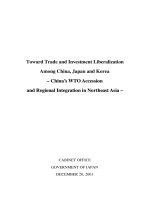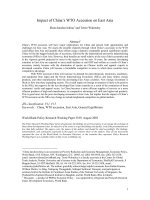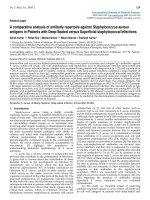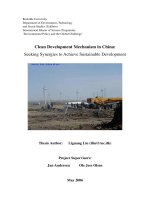OBAMA REBALANCES AGAINST CHINA
Bạn đang xem bản rút gọn của tài liệu. Xem và tải ngay bản đầy đủ của tài liệu tại đây (98.08 KB, 14 trang )
OBAMA REBALANCES AGAINST CHINA
His administration is finally taking a tougher stance on Beijing after years wasted
trying for cooperation.
It may have seemed rude for Secretary of State Hillary Clinton to jet off to China
just minutes after finishing a gala dinner for Japanese Prime Minister Yoshihiko Noda
in Washington on Monday. Yet Japanese officials, and others in Asia, should take
comfort from Mrs. Clinton's travel schedule.
After reaffirming the centrality of the U.S.-Japan alliance to America's security
policy in Asia, the Obama Administration is gearing up for a difficult meeting in
Beijing between the secretaries of State and Treasury and their Chinese counterparts.
In its final months, the Obama administration is beginning to rebalance America's
Asian relations away from China and toward old partners.
Now that Mrs. Clinton has arrived in Beijing, Sino-U.S. relations seem headed for
a potentially turbulent spell. The rhetorical shift against China began over 18 months
ago, in Hanoi, when Mrs. Clinton inserted the United States into the middle of roiling
territorial disputes in the South China Sea. President Obama doubled down on the
position last year, proclaiming a U.S. "pivot" to Asia that would see increased
deployment of U.S. forces around the region, including 2,500 Marines to Darwin,
Australia, and new U.S. warships in Singapore.
While these moves disturbed Beijing, recent events are far more likely to
antagonize Chinese leaders. First, after three years of staying largely silent on human
rights issues, including the house arrest of Nobel Peace Prize winner Liu Xiaobo in
2010, the U.S. Embassy in Beijing last week gave refuge to blind activist Chen
Guangcheng, who escaped from his own domestic confinement.
This is something Washington has not done since the dramatic harboring of
dissident Fang Lizhi in 1989 after the Tiananmen Square massacre. This puts
Washington directly in the middle of Chinese domestic politics and in response, the
administration over the weekend dispatched its top official on Asia, Assistant
Secretary of State Kurt Campbell, to Beijing to discuss the situation with Chinese
leaders.
Secretary Clinton's official Beijing reception this week may be less than friendly.
Then there's the news from last Friday that the Obama administration has agreed
to consider selling F-16 fighters to Taiwan. Last year, the White House announced it
would help upgrade Taiwan's older F-16s, but would not approve the sales of newer
models. Now, however, a letter to U.S. Senator John Cornyn indicates that new jets
are indeed being considered. As one Washington insider noted, such language is not
used by an administration unless the decision to go ahead has already been made. The
move is certain to upset Beijing.
And while it's laying down new rules in its relations with China, the Obama
administration is reinvigorating its ties with old partners throughout Asia. Japan and
the United States have finally agreed to resolve a lingering dispute over relocating a
U.S. Marine Corps helicopter squadron in Okinawa, thereby freeing up the move of
9,000 Marines off the island. Japan has also agreed to buy the U.S.-made F-35 as its
next fighter, and to relax prohibitions on exporting arms, all of which will allow it to
train and operate more closely with American forces.
Moreover, just before hosting the Japanese leader for dinner, Mrs. Clinton and
Defense Secretary Leon Panetta met with their Philippine counterparts for the first-
ever summit between the two countries' top defense and diplomatic officials. This
comes on the heels of a week-long face-off between Chinese and Philippine maritime
patrol vessels over Chinese fishing activities in disputed waters in the South China
Sea.
The Philippine officials are expected to seek closer maritime security relations
with Washington, and there are rumors that an agreement to allow temporary
deployment of U.S. forces on Philippine territory is being mooted, though nothing
official came out of this week's meeting. This would mark a limited U.S. return to the
Philippines exactly 20 years after the main U.S. bases at Subic and Clark were closed.
U.S. critics of the administration's pivot have asked how Washington intends to
increase its presence in Asia while simultaneously cutting defense spending by almost
$500 billion. The White House has yet to provide a compelling answer to that
question, but clearly it is hoping to offset the increased pressure on U.S. forces by
creating new opportunities for foreign engagement in Asia.
So far, that is an acceptable strategy. In the short-run, these recent moves will
reassure allies and partners that Washington intends to cover more territory in Asia
than in recent years. Other nations will also take notice of the new, more realistic line
toward Beijing. This may convince them that the U.S. will not sacrifice regional
stability to the chimera of greater engagement with China.
Of course, Mr. Obama's new tack may cause the Chinese to become more
obstreperous. Already there is whispering that Mrs. Clinton will face a harder line
herself while in Beijing. It is also possible that when Chinese Vice President Xi
Jinping takes over as president later this year, he will decide to act less cooperatively,
so as to prove to the military and other hardliners within the Communist Party that he
won't take America's new stance lying down.
All this posturing is in some ways Mr. Obama's own fault, since Beijing's
combative behavior is the fruit of his administration's decision back in 2009 to try to
create a strategic partnership with China. Ignoring the warning signs, Washington was
rewarded with a far more assertive China.
At least, the administration is now trying to rebalance the scales in Asia. If for
nothing else, Mrs. Clinton's hectic schedule is worth it if America restores its
credibility in this part of the world.
Obama cân bằng lại với Trung Quốc
Chính quyền của ông cuối cùng đang thực hiện một quan điểm cứng rắn hơn với
Bắc Kinh sau nhiều năm cố gắng hợp tác một cách vô ích.
Có vẻ là khiếm nhã cho Ngoại trưởng Hillary Clinton khi vội vã đến Trung Quốc
chỉ vài phút sau lúc kết thúc tiệc tối với Thủ tướng Nhật Bản Yoshihiko Noda tại
Washington vào một ngày thứ hai. Nhưng các quan chức Nhật và những người khác ở
châu Á, nên cảm thấy sự an ủi từ lịch trình đi lại của bà Clinton.
Sau khi tái khẳng định vai trò trung tâm của liên minh Mỹ - Nhật trong chính sách
an ninh của Mỹ tại châu Á, chính quyền của Tổng thống Obama lại vội vã chuẩn bị
cho những cuộc gặp khó khăn ở Bắc Kinh giữa các bộ trưởng ngoại giao và ngân khố
với những người đồng nhiệm Trung Quốc. Trong những tháng cuối cùng của nhiệm
kỳ, chính quyền của Obama đang bắt đầu cân bằng lại các mối quan hệ châu Á của
Mỹ theo cách xa rời Trung Quốc và hướng tới những đối tác cũ.
Và lúc bà Clinton cùng các quan chức Mỹ đã ở Bắc Kinh, thì quan hệ Mỹ - Trung
đang ở giai đoạn có thể nói là khởi đầu cho một khả năng bất ổn. Những tuyên bố thể
hiện sự thay đổi đối với Trung Quốc bắt đầu từ 18 tháng trước, khi trong một hội nghị
an ninh khu vực, Ngoại trưởng Clinton đã chính thức đưa Mỹ vào cuộc tranh chấp
lãnh thổ ở Biển Đông. Bà tuyên bố Mỹ có một lợi ích quốc gia trong việc bảo vệ tự
do hàng hải và thương mại không cản trở tại vùng biển quan trọng này.
Tổng thống Obama đã tăng gấp đôi sức nặng của quan điểm ấy vào năm ngoái,
khi tuyên bố Mỹ "xoay trục" về châu Á, rằng nơi đây sẽ chứng kiến sự gia tăng các
lực lượng Mỹ được triển khai khắp khu vực bao gồm cả 2.500 lính thủy đánh bộ Mỹ
tại Darwin, Australia cũng như hàng loạt tàu chiến mới của Mỹ ở Singapore.
Obama cân bằng lại với Trung QuốcTrong khi các động thái này khiến Bắc Kinh
lúng túng, thì những sự kiện xảy ra gần đây càng khiến các nhà lãnh đạo Trung Quốc
bối rối hơn. Lần đầu tiên, sau nhiều năm phần lớn yên lặng, đại sứ quán Mỹ ở Bắc
Kinh đã có động thái về vấn đề nhân quyền. Nhà hoạt động khiếm thị Trần Quang
Thành - nhân vật bất đồng chính kiến với chính quyền Trung Quốc đã "trốn khỏi nhà
riêng" ở tỉnh Sơn Đông, bí mật tới Bắc Kinh, trú ngụ trong Đại sứ quán Mỹ gần một
tuần.
Sau khi có thông báo ông Trần đã rời Đại sứ quán Mỹ, bộ Ngoại giao Trung Quốc
yêu cầu Washington xin lỗi. Ông Lưu Vị Dân, phát ngôn viên của Bộ Ngoại giao
Trung Quốc nói rằng, ông Trần đã được đưa vào Đại sứ quán Mỹ "bằng các biện pháp
bất thường" và chính quyền Trung Quốc "cực kỳ khó chịu".
Người phát ngôn họ Lưu nhấn mạnh, Bắc Kinh không chấp nhận "hành động can
thiệp" và nhắc nhở Mỹ tuân theo luật quốc tế và luật Trung Quốc.
Đây là điều mà Washington chưa từng làm kể từ năm 1989. Nó đặt trực tiếp
Washington vào giữa công việc chính trị nội bộ của người Trung Quốc và để đáp trả,
chính quyền Obama phải tức tốc phái quan chức hàng đầu của mình phụ trách vấn đề
châu Á - trợ lý ngoại trưởng Kurt Campbell tới Bắc Kinh thảo luận tình hình với các
nhà lãnh đạo Trung Quốc.
Sau đó là những tin tức cho thấy, chính quyền Obama đã nhất trí xem xét việc bán
máy bay chiến đấu F-16 cho Đài Loan. Năm ngoái, Nhà Trắng tuyên bố sẽ giúp nâng
cấp các máy bay F-16 cũ của Đài Loan, nhưng sẽ không chấp nhận bán các loại máy
bay mới hơn. Tuy nhiên, giờ đây, một bức thư tới Thượng nghị sĩ John Cornyn cho
thấy, trên thực tế, các máy bay mới sẽ được cân nhắc. Động thái này chắc chắn khiến
Bắc Kinh phật lòng.
Và trong khi đang thiết lập những quy tắc mới trong mối quan hệ với Trung Quốc
thì chính quyền Obama không ngừng nỗ lực khôi phục và tăng cường quan hệ với các









